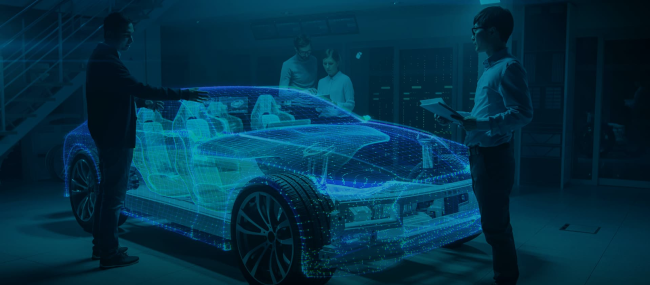
Automakers risk being overtaken by digital-native EV manufacturers, study finds
By DE staff
General AutomotiveHexagon white paper reports only 8% of automotive OEMs see pure-play EV entrants, like Tesla, as a threat.

(Photo credit: Hexagon)
The root of the problem, the study argues, is that traditional carmakers aren’t prioritizing adoption of industry 4.0 processes, while new entrants are leveraging digitization and automation to reduce time-to-market from several years to as little as three months.
To support its case, the white paper states that only 48% of the auto industry report they plan to invest more in the types of smart manufacturing strategies their new player competitors are using, while 25% have no plans. This is despite the fact that the EV market is projected to grow to US$34.7 million in sales by 2030.
The research also finds that only 8% of carmakers see pure-play EV manufacturers as a threat, despite Tesla’s position as the market leader for battery electric vehicles (BEVs), and EV makers like Lucid are rapidly are scaling up with vertically-integrated EV production.
According to the white paper – The Electric Vehicle Pivot – new players benefit from the fact that low EV order volumes have made ‘speed’ the key factor in automotive manufacturing rather than ‘scale’. This shift puts traditional automaker at a disadvantage since the design of electric vehicles makes upwards of 90% of ICE automotive parts unnecessary. As a result, EV production is less reliant on incumbent automakers’ strengths: Current supply chains and mass-manufacturing plants.
The report also acknowledges the struggles larger OEMs have in matching new players’ progress towards digital transformation. While interest has increased, the white paper finds that recognizing “smart” automotive manufacturing’s value doesn’t always go hand-in-hand with implementing it.
“Our findings show that automakers’ challenges in getting a foothold in the new EV world order are as much internal as they are external,” says Hexagon Manufacturing Intelligence division president, Paolo Guglielmini. “The need to make EVs more affordable at current order volumes – coupled with delivering greater choice or ‘cars-to-order’ – means traditional, high-volume manufacturing lines must be replaced by more agile manufacturing, built around speed-to-market and possibly forgoing the ‘just-in-time’ model for good.
“The challenge for incumbents is doing so, while still achieving the required profit margins,” he adds. “This can only be resolved through vertical integration of development and manufacturing processes, but this isn’t easy and necessitates a cultural shift to match the technology investments.”
https://hexagon.com/divisions/manufacturing-intelligence
